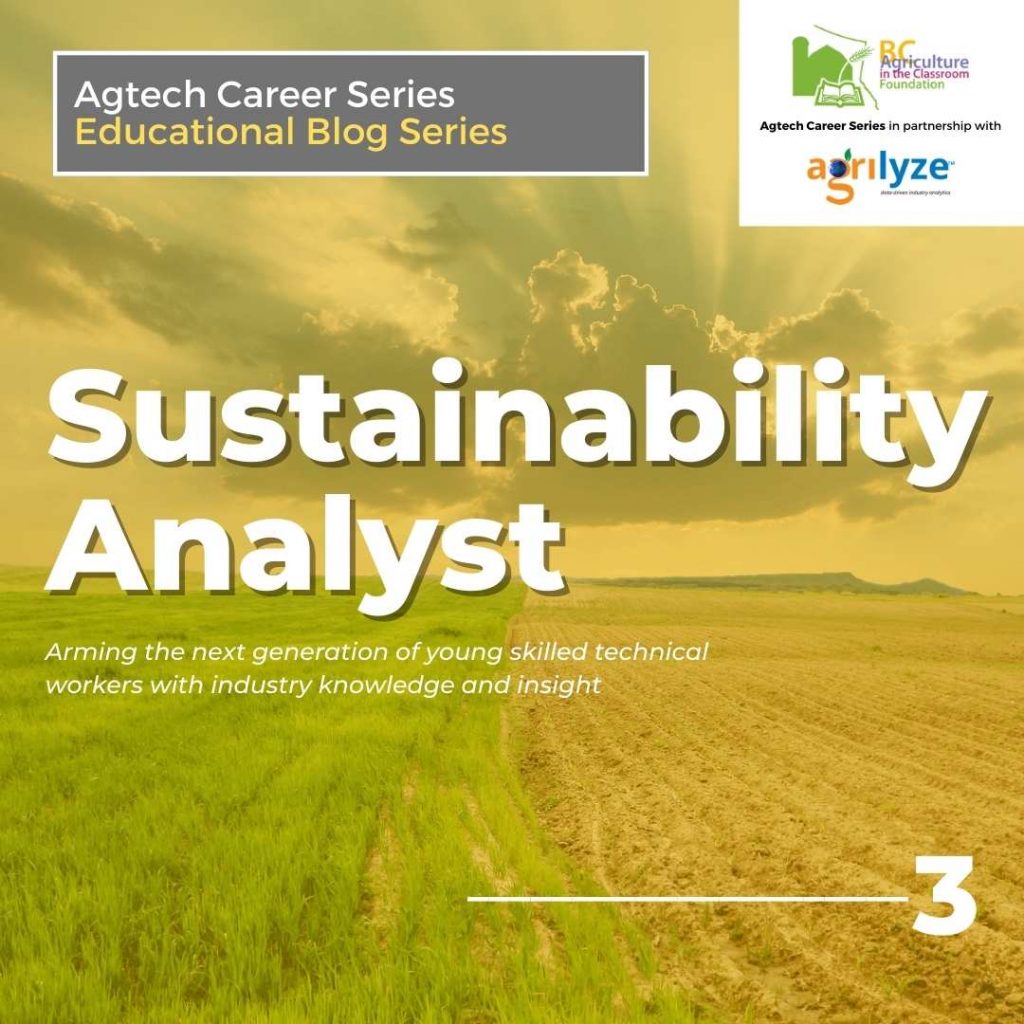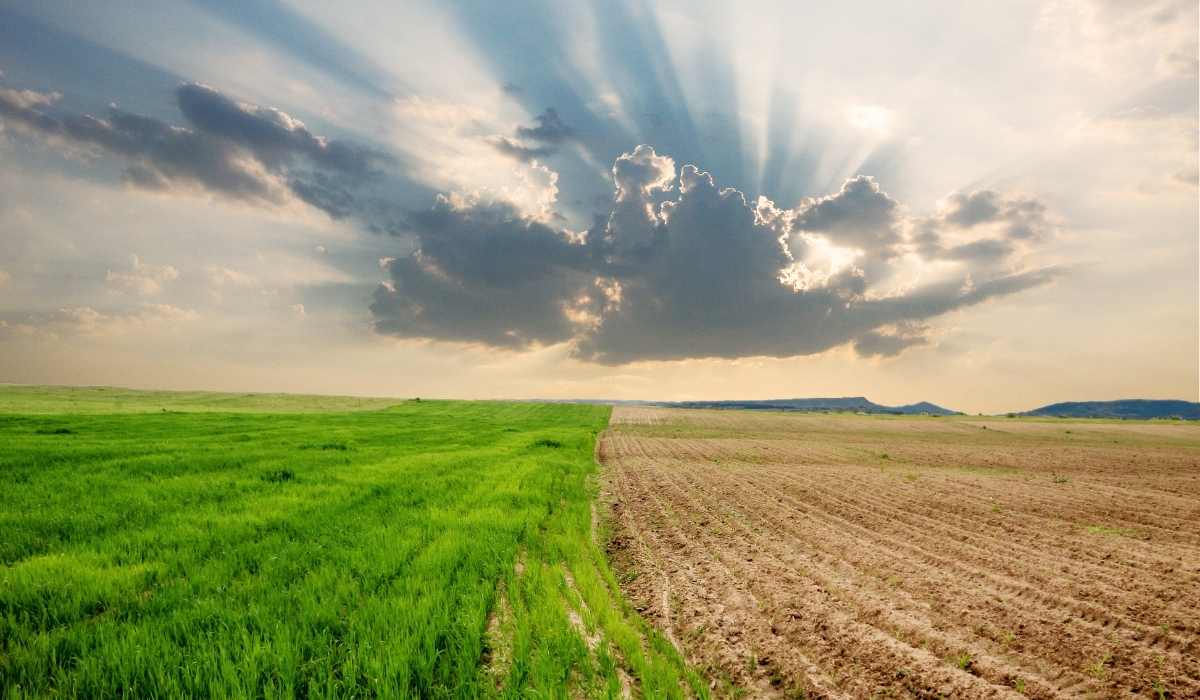Agtech Career Series: Career 3 – Sustainability Analyst
A sustainability analyst collects data and runs tests to gather statistics around programs that require sustainability indicators. These indicators are used to determine the effectiveness of the sustainability aspect of a program and its objectives. Some sustainability measurements include:
- Quantity of waste generated and disposed of
- Usage rate of electricity and other natural resources
- Volume of waste products that are recycled successfully
Sustainability is an essential consideration on a farm. Farmers must ensure that they provide their communities with a sufficient supply of healthy, diverse, and safe food. With concerns of a growing population, sustainability becomes critical as it directly impacts the environment and how we cope with issues like climate change.
Innovation in agriculture is a central part of the solution. One of the most significant components to farming more sustainably is using our natural resources more efficiently and responsibly. Sustainability analysts can project energy savings and the overall feasibility of sustainable practices and methods. Then, they can develop methodologies and document the steps it will take to get to more sustainable solutions.
As the agriculture industry grows, it becomes more dynamic. Innovative technologies and approaches in biology, biotechnology, chemistry, and more create new business models that help farmers approach their traditional practices with more modernity. Some examples of these new, sustainable approaches are vertical and carbon farming, both of which focus on optimizing resources to produce more with less.
Let’s delve in a little bit more.
Vertical farming allows farmers to grow crops in vertically stacked layers. As you would imagine, this prioritizes space, a valuable resource these days in agriculture. By incorporating a controlled environment, farmers can optimize plant growth and even employ soilless techniques like aquaponics, hydroponics, and aeroponics. According to researchgate.net, vertical farming “can be potentially beneficial in increasing food production, maintaining high quality and safety and contributing to sustainable urban farming”.
In carbon farming, excess carbon is transferred out of the atmosphere (where it does a lot of harm) and into the soil (where it does a lot of good). According to climate.org, “soil has been identified as an underutilized carbon sink, with a great potential to alleviate climate pressure”. Essentially, carbon is a vital component of our soil. It gives it better water-retention, structure and fertility. By following sustainable practices like carbon farming, we can improve soil quality worldwide, contributing to greater food security and ultimately increasing productivity and farm resiliency.
Sustainability in farming should focus on the benefits it can present economically, socially, and environmentally. There must be a balance between these factors to change the industry. Integrated and tailored solutions will drive digitization, and at the core of it all, we can rely on sustainability to transform our world. This connectivity has the power to solve global challenges, and sustainability analysts play an integral role in ensuring we are on the right track.
The position requires attention to detail, flexibility, and enthusiasm. The analyst must have the ability to perform both quantitative and qualitative analyses, with the proper people skills to advise farmers on ways to be more sustainable.
Core Functions of the Role
- Data Analysis – the analyst must conduct a variety of different theoretical and numerical analyses. They will collect, manage, track, analyze, and summarize data.
- Sustainability Knowledge & Strategies – the analyst will consult with different farms to find more sustainable solutions. They will require in-depth knowledge of the industry and which sustainability strategies the farm can pursue.
- Communication – the analyst needs to be adept at communicating in all forms (written, verbal, visual/graphic). Ideally, they can translate technical information clearly, concisely and in an accessible manner.
- Project Management – the analyst should have good leadership skills and take on different projects to produce results for the farmers.
- Resourcefulness – the analyst will typically work as a small business, so the ‘all-hands-on-deck approach’ is helpful. New responsibilities will come up, and they should be able to adapt rapidly and proactively.
Skills & Abilities
- Thinks critically, problem-solves and troubleshoots issues
- Possesses excellent planning and organizational skills
- Prioritizes while managing multiple duties and tasks
- Is professional and cooperative
- Can work with minimal supervision and in a team-oriented environment
- Understands sustainability concepts and energy efficiency practices
- Knows data collection and assessment techniques
What Is a Sustainability Concept?
As we mentioned earlier, a sustainability concept focuses on three pillars – the economy, society, and environment.
At its root, sustainability is an approach that meets the needs of future generations. The very word describes something that can be ‘sustained’ or is ‘bearable and capable of being continued at a certain level’. In our case today, we are trying to prevent the depletion of natural resources. If our actions cause little, less (‘do more with less’), or no harm to the natural world, we are on the right track.
A sustainability analyst can help farms operate more efficiently, generating more agreeable conditions that enable farmers to improve their products’ quality and distribution.
Work Environment & Physical Requirements
Sustainability analysts typically work inside an office, and the occasional evening or weekend may be required. They will need a vehicle to travel between the office, campus locations and the businesses they serve in the local area. Minimum physical exertion is required.
Qualifications
- Bachelor’s degree in Sustainability, Environmental Science, Mathematics, Engineering or related field. Relevant experience may substitute for the degree requirement on a year-for-year basis.
- One year of related professional experience in conducting research, performing statistical analysis, and evaluating environmental issues.
How Agrilyze Can Help
- Capture and record data that can be used to report on
- Connect to IoT devices to allow real-time information to be collected and analyzed
- Enable users to make better decisions right now and, over time, predict what the best decision might be through the collection of data and use of Artificial Intelligence algorithms
- Look at the farm in new ways with a variety of aggregated information, including sensors and imagery
- Build custom forms that allow users to collect what they need in the field, as one of the keys to sustainable/regenerative farming is data collection
- Provide the economic value of what is being managed and changed by tracking revenue and expenses in Agrilyze
- Record and track records of conversations
- Allow data to be shared across the farm between different individuals
- Track what happens, when it happens and where it happens on the farm (traceability)
- Track and alert as to when a task should happen
- Standardize and digitize data that is collected so it can be searched and compared
View Agtech Career 3 – Sustainability Analyst Info Sheet



